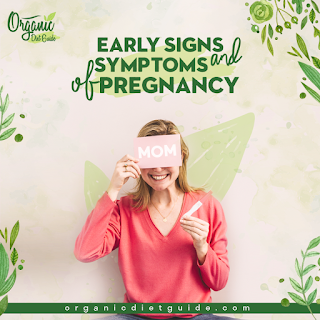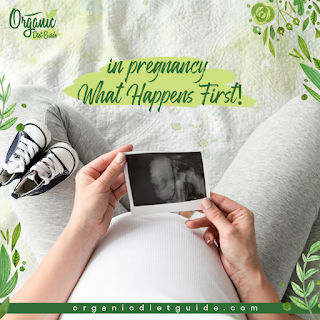Having a Baby | What Happens During the Trimesters of Pregnancy?!
Symptoms of pregnancy, What happens first, Women's Health..
A missed menstrual period is often the first recognizable sign of a possible pregnancy, but there are other signs and symptoms of early pregnancy as well.
Some subtle signs appear in the first week, and more may be apparent in the weeks before your first missed period.
Keep in mind that not all women have all symptoms or experience them in the same way. Some of the most common first-trimester pregnancy symptoms are discussed in the following slides.
The first sign many women recognize as an early sign of pregnancy is a missed menstrual period.
|
Having a Baby | What Happens During the Trimesters of Pregnancy?! |
Missed Period
A missed menstrual period can be caused by other conditions aside from pregnancy, so it is not always a definitive sign.
You may notice tenderness or swelling in your breasts in the first or second week after you conceive.
Breast Swelling, Tenderness, and Pain
Breast enlargement, tenderness, or pain similar to premenstrual symptoms can occur early in pregnancy.
The breasts may feel full or heavy, and the area around the nipple (areola) may darken.
A dark line called the linea nigra that runs from the middle of the abdomen to the pubic area may appear. You may notice tenderness or swelling in your breasts in the first or second week after you conceive.
Secret Anabolic Recipes | Cook Healthy | Muscle Building Meals
A woman experiences nausea and vomiting due to morning sickness.
When Does Morning Sickness Start?
“Morning sickness” is nausea and vomiting that typically come in the morning in early pregnancy.
This usually happens between weeks two and eight of pregnancy. It’s somewhat a misnomer because nausea and vomiting can actually happen at any time. It’s thought that changes in levels of estrogen may play a role in developing nausea.
Another early pregnancy sign may be food cravings or aversions. Women may have an unusual urge to eat a particular food, even one she previously did not like, or she may be completely repulsed by the food she used to love.
This is common, and usually, the food aversions fade at the end of the first trimester.
Is Bloating an Early Sign of Pregnancy?
The rise in progesterone during pregnancy can also cause abdominal bloating, fullness, and gas.
The weight gain in the first trimester is usually minimal, but swelling and fluid retention may make you feel as if you have gained more than the typical one pound per month.
The urge to urinate more frequently starts about six weeks into pregnancy.
Frequent Urination
The urge to urinate more frequently starts about six weeks into the pregnancy, thanks to the hormone human chorionic gonadotrophin (hCG), which causes increased blood flow to the pelvic area and can stimulate the urge to urinate.
|
Having a Baby | What Happens During the Trimesters of Pregnancy?! |
Later in pregnancy, the urge to urinate may be increased by the growing baby in the enlarging uterus putting pressure on the bladder.
Basal Body Temperature in Pregnancy
Many women hoping to become pregnant will chart their basal body temperature (the lowest body temperature in a 24-hour period, usually first thing in the morning after waking).
The basal body temperature usually rises around ovulation and lasts until the next menstrual period. If the basal body temperature stays high for longer than that, this may indicate pregnancy.
Thin, milky, vaginal discharge is normal throughout pregnancy, and it may occur every day that you are pregnant.
This is called “leukorrhea,” and it is caused by the extra estrogen your body is now producing. This discharge may be white or clear, and it may have a mild odor or none at all, all of which is normal.
This is a necessary side effect of pregnancy, so there is no medical treatment for leukorrhea. However, it may be distressing for some women. Panty liners can help. But avoid tampons, which may cause infections.
Many pregnant women become constipated. Possibly more than 35% of pregnant women develop this discomfort according to some experts.
This may be due to the hormonal changes that pregnancy causes, including an increase in progesterone.
If you have constipation, your doctor may tell you to drink more fluids, eat more fiber, and get enough exercise to move things along.
But if these safe remedies don’t work, with a doctor’s guidance you may find other helpful treatments that are safe during pregnancy, such as certain types of laxatives. Do not take any medication while pregnant without your doctor’s recommendation.
Changes in the mother’s body:
|
Having a Baby | What Happens During the Trimesters of Pregnancy?! |
During pregnancy, many changes are also happening in the body of the mother-to-be. Women experience these changes differently.
Some symptoms of pregnancy continue for several weeks or months. Others are only experienced for a short period of time.
Some women experience many symptoms. Other women experience only a few or none at all. The following is a list of changes and symptoms that may happen during the first trimester:
The mammary glands enlarge causing the breasts to swell and become tender in preparation for breastfeeding.
This is due to an increased amount of the hormones estrogen and progesterone. A supportive bra should be worn.
A woman’s areolas (the pigmented areas around each breast’s nipple) will enlarge and darken. They may become covered with small, white bumps called Montgomery tubercles (enlarged sweat glands).
Veins become more noticeable on the surface of the breasts.
The uterus is growing and begins to press on the woman’s bladder. This causes her to need to urinate more often.
Partly due to surges in hormones, a pregnant woman may experience mood swings similar to premenstrual syndrome.
This is a condition experienced by some women that are characterized by mood swings, irritability, and other physical symptoms that happen shortly before each menstrual period.
Increased levels of hormones to sustain the pregnancy may cause “morning sickness.” This is feelings of nausea and sometimes vomiting.
However, morning sickness does not necessarily happen just in the morning and rarely interferes with proper nutrition for the mother and her fetus.
Constipation may happen as the growing uterus presses on the rectum and intestines.
The muscular contractions in the intestines, which help to move food through the digestive tract, are slowed due to high levels of progesterone.
This may, in turn, cause heartburn, indigestion, constipation, and gas.
Clothes may feel tighter around the breasts and waist, as the size of the stomach begins to increase to accommodate the growing fetus.
A woman may experience extreme tiredness due to the physical and emotional demands of pregnancy.
Cardiac volume increases by about 40% to 50% from the beginning to the end of the pregnancy. This causes an increased cardiac output.
An increased cardiac output may cause an increased pulse rate during pregnancy. The increase in blood volume is needed for extra blood flow to the uterus.
|
Having a Baby | What Happens During the Trimesters of Pregnancy?! |



